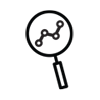Above artwork by Sarah Wilkins, third year, faculties of Health and Arts
Download an accessible PDF version of this report
From the University Librarian
Welcome! As I reflect on 2020, I invite you to explore stories of resilience, agility, and new directions in the University of Waterloo Library’s first public annual report. These curated stories reveal critical insights into the role of the Library in developing the talent of the future at one of Canada’s most innovative universities.
As we look ahead to 2021, we begin with what we learned and accomplished in 2020.
It was a year like no other in recent history, with the global COVID-19 pandemic, and protests over racial violence and injustice testing our collective humanity and strength. The University of Waterloo Library, part of an agile network of Canadian and North American research libraries, engineered new and equitable ways of ensuring that information and expertise is at our users’ fingertips, regardless of their location and means.
What have we accomplished? With a fresh strategy, the Library seeks to be a key partner in learning and research, actively engaging with learners, researchers and community. We greatly increased digital access and virtual interactions — making library information expertise accessible to anyone with an internet connection. We made great strides forward in helping Waterloo learners navigate increasingly complex information. We implemented controlled digital lending of more than a million books in our physical collection, and advocated with publishers to increase open access to digital books and journals. The Library added new rare and special collections, and increased digital access to them through the Waterloo Digital Library. We are working to enhance diversity in the voices and perspectives represented in the Library’s collections to support inclusive, equitable scholarship.
All of this, and more, with excellent results that reinforce the direction we are taking to support thousands of students, instructors, employees and others who depend on the University of Waterloo Library for expert assistance with their critical information needs.
Of all the years to begin with an annual report, I am particularly delighted we chose this year. The stories between these pages reveal both excellence and commitment to quality information services that might otherwise go untold. I thank you for your interest and support and invite you to read, enjoy, share and let us know what you think. Contact us at universitylibrarian@uwaterloo.ca.

University Librarian
Beth Namachchivaya
CONTENTS
click on each icon below
TRANSITIONING LIBRARY LEARNING
Playing our part in teaching and learning

The Library has always been instrumental in contributing to academic success at the University. One such area where our librarians have had a significant impact is in the instruction of undergraduates across all six faculties by embedding content into first year communication courses. Library content in these courses focuses on developing information gathering and analysis skills to support lifelong learning. The courses prominently feature library tools and resources.
When classes went online in March 2020, librarians worked quickly and diligently to convert the content to online modules and quizzes. For example, modules to support Arts 130 and 140, science communication and engineering communication classes were designed to meet the desired learning outcomes and provide interactive activities to keep students engaged.
Online Learning Object Repository (OLOR)
Although plans were underway to create the Online Learning Object Repository, the Library recognized the importance of this tool for online learning in the pandemic environment. The project was prioritized and was released well ahead of its original schedule, launching in June 2020.
This custom-built web environment hosts and provides access to library learning objects. It currently holds 60 pieces of instructional content, including handouts, slide decks, digital modules, infographics, podcasts, videos, graphics and images, all with accessible alternate formats available. For instructors, the OLOR makes it easy to upload, link to and share e-learning materials in LEARN or other course management tools. Students and faculty can discover and use OLOR content 24 hours a day/seven days a week.
Visit the OLOR site to learn more about this online learning tool.
The Library as muse
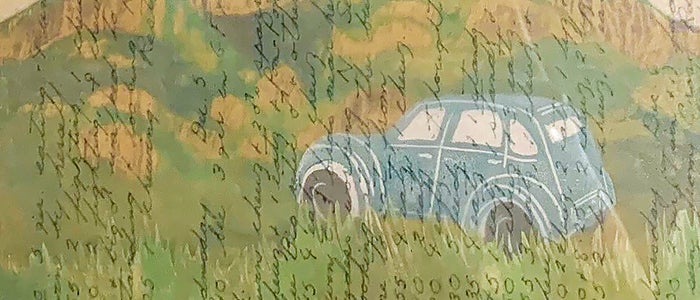
Artwork by Sarah Wilkins, third year, faculties of Health and Arts
How the Anne Innis Dagg collection inspired third-year student Sarah Wilkins
Typically, Special Collections & Archives in the Library welcomes fine arts students to experience the archives through instructional sessions.
With the pandemic, in-person sessions were cancelled, so staff took a different approach and created a socially-distanced video about the archives and collections. While things looked different this year, the Library’s efforts helped students produce inspired art.
Sarah Wilkins is a third-year student pursuing a joint honours degree in Recreation and Leisure Studies and Fine Arts. She was working on her “Library as muse" project when she was introduced to the work of Anne Innis Dagg through Special Collections & Archives.
“Our professor, Tara Cooper, focused on Anne’s work as a way to spark interest for us,” says Wilkins. “I ended up watching the documentary about her (The Woman Who Loves Giraffes). I connected with her story.”
Anne Innis Dagg can best be described as a pioneer in the study of giraffes. At only 23 years old, Dagg set off for South Africa in 1956 and was the first person to study giraffes in the wild. Dagg’s research is referred to as “the bible” for giraffe biologists around the world.
Although she made significant contributions to science, Dagg faced a number of challenges in her career, yet she persevered and funded her own research in Africa while working part-time at the University of Waterloo. During her time as the head of Independent Studies at Waterloo, Dagg’s students often used the archives as an important source for research.
Now 86 years old, Dagg was pleased to contribute her collection to the Library.
“The collection I contributed to the Special Collections & Archives is mostly information I feel might not be saved when I die,” says Dagg. “Most important are the documents dealing with giraffes. I have been impressed by the service at the archives.”
Working with Dagg’s collection, Wilkins painted original images inspired by Dagg’s photography, as well as her notes from her first trip to South Africa.
“She was the same age as me when she went off to South Africa,” says Wilkins. “One of the photographs had her car — a teal blue car. It was just so cool and unique, but relatable to the work she was doing in her twenties. I was inspired by her courage. She was willing to push boundaries away. The difficulties she faced as a woman have given me perspective. It’s inspiring that she kept going and made an amazing career despite the barriers.”
Before the project, Wilkins wasn’t aware of the archives, but has come to appreciate how looking at documents from the past can inspire new ideas.
“The inspiration for art can come from so many different places,” says Wilkins. “The archives have inspired me to look deeper into the stories of people and the past because of what I can learn from those stories. It has inspired me to create more from that source of inspiration.”
ENHANCING RESEARCH SUPPORT
Leveraging services to support students and faculty
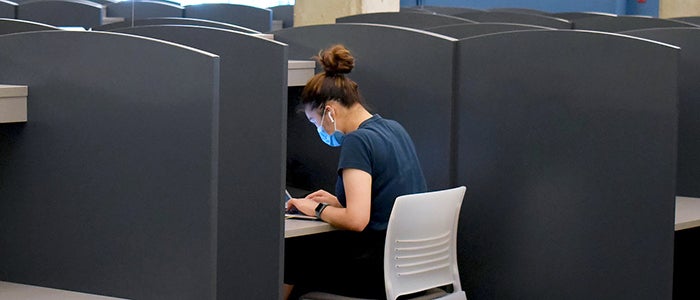
When the World Health Organization declared a pandemic in March 2020, everything changed on Waterloo’s campus. As the entire University community moved to virtual learning, we found new ways to ensure access to the Library's expertise and resources.
Online and chat services
To maintain a high level of service, staff provided ongoing support through extended hours for email and chat service, which has proved to be exceptionally valuable, as indicated by the increase in demand throughout 2020.
Expanding digital access
Ensuring students and researchers had access to as many resources as possible quickly became a top priority. The Library joined the HathiTrust Digital Library in July 2020, allowing us to offer online digital versions of 830,000 book and journal volumes from our print collection for the duration of the pandemic (as well as more than 4.4 million public domain and Creative Commons-licensed works). The Library also invested in the Journal of Visualized Experiments (JoVE), a database of educational videos that demonstrate key concepts and laboratory methods and protocols for STEM topics, and the Digital Scholar Lab (DSL), providing researchers access to tools and content to analyze and work with large amounts of textual data.
Data and research tools
Augmenting tools to aid researchers as they continued their work in an all-digital environment was another area of focus for the Library in 2020. Two examples of the Library’s quick response was to acquire Covidence, a web-based software platform that streamlines the production of systematic reviews and other comprehensive literature reviews, and to purchase the City of Toronto Light Detection and Ranging (LiDAR) data set. LiDAR is high-resolution data used to create digital elevation models, and is used widely by engineering researchers and practitioners, as well as architects and planners.
Course Reserves
While Course Reserves have been mostly digital for some time, the service became critical with the onset of the pandemic. The team found a variety of alternatives, collaborating with the W Store to find and license electronic versions of textbooks or locating free e-versions of texts that could be made available to students through the Library. The team also partnered with 10 other Ontario college and university libraries to share material previously scanned under fair dealing guidelines.
Book pick up and mail services
The demand for printed material did not disappear when the Library closed. Over the course of 2020, the library team introduced new services to help users, including book pick up and a “books by mail” option where items could be mailed to a campus office or to any address within Canada. In November, the program was expanded to allow students, faculty and staff to borrow books and other physical items from the University of Guelph, Wilfrid Laurier University, and the TriUniversity Annex.
Creating space on campus
Students who continue to live and study on campus may need the quiet study spaces in the Library. As lockdown measures eased, spaces were made available to students by appointment and with strict health protocols in place. Each study area is sanitized regularly to ensure a safe space for students.
Creating a better search experience
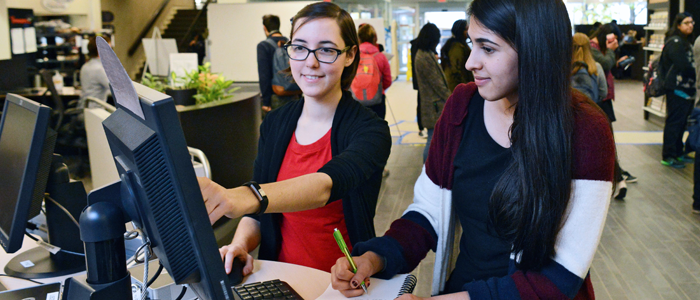
In 2020, the Library joined 15 other members of the Ontario Council of University Libraries (OCUL) to create a single academic search tool called Omni.
Along with a responsive and accessible interface and a streamlined login process, Omni helps provide users with greater visibility to available resources. It also allows for a simplified request process, making it faster and easier for users to access the resources they need.
The new library catalogue allows patrons to search:
- Waterloo’s print and electronic resources, including peer-reviewed articles
- Highlighted collections, such as the Indigenous peoples in Canada reading list
- Print and electronic journal titles, as well as a wide variety of newspapers
- Print resources from across 16 Ontario universities, which makes it easier to make a request
Improving service
For library staff, the entire system has provided an opportunity to improve partnerships with other institutions by sharing resources. The collaboration will result in increased efficiency by reducing the duplication of work taking place at each library. Through this partnership, the libraries have created a shared infrastructure for collectively managing and preserving legacy print collections.
Behind the scenes
While the new search system was designed to be seamless for users, behind the scenes staff worked for more than a year with OCUL and its member institutions to implement what amounted to an entirely new library system. This new system has allowed staff to try out new integrated tools to improve workflows for activities such as interlibrary loan and acquisitions.
Leading the way in bibliometrics

The Library at Waterloo has always played an important role in supporting researchers, including the use of bibliometrics to understand the impact of their publications.
Bibliometrics uses various methodologies, including counting publications, citations and authorship to measure research output. When paired with other indicators, such as research funding awards, publication acceptance rates and other qualitative material, bibliometrics uncovers data that answers important questions, including:
- What are our areas of research strength?
- How do we compare to similar research institutes?
- Where are areas for potential research collaborations?
At Waterloo, bibliometrics became an important institutional endeavour in 2012 when the University embedded transformational research as a key theme in the 2013-2018 Strategic Plan.
Bibliometrics and the Library
The bibliometrics and research impact librarian is seen as the campus expert on bibliometrics. While the Library is the day-to-day service hub for bibliometric data needs, Waterloo’s framework for supporting institutional bibliometrics is firmly rooted in collaboration with the Working Group on Bibliometrics, which includes representation from faculties and research institutes across campus, as well as Institutional Analysis and Planning and the Office of Research.
Why the Library?
With a deep knowledge of bibliographic data and tools, the Library is the logical choice for leading the adoption of bibliometrics. The Library has a long history of liaising between academic support groups and faculties as well as expertise in research and scholarly communication.
Key initiatives
Over the last five years, the Library has been involved in several key initiatives to advance the use of bibliometrics across campus.
- The publication of the 2016 White Paper on Measuring Research Output through Bibliometrics (PDF) has helped expand the use of bibliometrics across campus.
- In 2019, we undertook a detailed review of current assessment tools and recommended continuing with the current slate of tools.
- Our ongoing work includes supporting the University in monitoring the latest strategic plan, which has identified a new set of areas of research excellence.
- We are partnering with campus stakeholders who conduct research related to equity, diversity and inclusion (EDI) in order to explore what bibliometrics can contribute to institutional understanding of EDI and research.
- By forming a new community of practice, the Library has created an informal group focused on training and sharing knowledge across campus. The group is open to anyone working with or interested in bibliometrics.
Looking towards the future
The Library will continue to nurture and expand our existing partnerships and collaborations while examining our capacity to determine appropriate staffing and training. We will actively monitor the evolution of tools specializing in bibliometric data and explore the full potential of the APIs of current data sources. We will also further explore visualization possibilities for bibliometric data.
As academic institutions increasingly need to quantify the research impact for a spectrum of internally and externally motivated purposes, the Library will continue to provide a leadership role in bibliometrics, while helping Waterloo critically evaluate bibliometrics and explore its role in understanding research impact.
BUILDING ON OUR COLLECTIONS
Expanding collections and a new way to serve the community
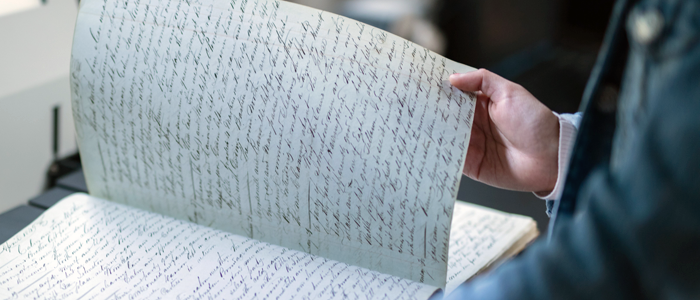
Special Collections & Archives (SCA) at Waterloo continues to serve the University and the broader community despite the strain caused by the pandemic. The SCA team has been tasked with finding new ways to serve the students, faculty, researchers and community members who regularly use the unique archival collection to support teaching, learning and research.
SCA has had to change their whole approach to service. They adjusted the time frame for how they respond to requests and are doing more research because people can't visit and explore the collection themselves.
The team has also been focused on growing the collection with key acquisitions aimed at diversifying the voices represented in the collections. The goal is to reflect both the University and the community.
The SCA team is excited by some of the new pieces that entered the Library’s collection in 2020:
- 1906 Canadian Society of Civil Engineers Pacific Coast trip
This collection of 120 photographs documents the early 20th century trip to Canada’s Pacific coast. The collection also reveals the number of women who practiced as civil engineers at that time. - Atrocities Against Indigenous Canadians for Dummies — A zine series created out of emotional exhaustion
This zine series, published by Jenna Rose Sands, a Nehiyaw/Anishinaabe/Lenape woman from London, Ontario, brings awareness to Indigenous history and struggles. - Mabel Fox scrapbook
Mabel Fox was a university student in Michigan who documented her experiences from 1921 to 1923 in a scrapbook. The detailed collection gives a rare, first-hand glimpse of the educational and social life of a woman studying at a co-ed university.
Flagging and tagging the collections
In addition to widening the Library’s special collections and archives holdings, SCA is also documenting and tagging the language used in some of the collections.
They are moving away from simply including a blanket statement alerting users to offensive language or imagery in a collection. Instead the team wants to flag such content at item-level. The team is also working to identify materials of interest to marginalized and equity-seeking communities.
To learn more about the collection
Visit the Special Collections & Archives website.
A FRESH STRATEGY
Library Strategic Plan 2020-2025

Our vision:
Your partner in learning, research and innovation.
Our mission:
The Library advances the creation, discovery, sharing and use of knowledge through research, teaching and community collaborations that complement the stewardship of distinctive collections, services and spaces.
With the launch of the Library Strategic Plan 2020-2025, we are proud to share our strategic priorities, revised mission and values statements, and a new vision statement to both anchor and chart our direction for the future.
The Library’s strategic plan focuses on three key impact themes — Catalyzing Learning and Research, Engaging with Our Community, and Growing as a Learning Organization — and presents 10 goals, three of which make up our strategic commitments:
- Equip scholars to navigate complex information
- Re-envision spaces and programs to maximize impact
- Empower staff to advance library services for learner success
Catalyzing learning and research to advance the creation, discovery and sharing of knowledge
The Library advances the creation, discovery, sharing and use of knowledge in places where learning, teaching and research happen. To this end, we aspire to embed the Library in all phases of disciplinary and interdisciplinary research inquiry — from ideation to dissemination to commercialization — and to apply our expertise to enable student learning, the development of unique collections, and the transformation of scholarly publishing.
Engaging with our community to meet its ever-evolving needs with even greater acuity
Community is at the heart of everything we do. It informs our current initiatives and guides our long-term efforts to create collections and services of enduring value.
Moving forward, we aspire to meet our community's ever-evolving needs with even greater acuity. We will design library spaces to align with campus directions for space, enrich our engagement with key audiences and reinvigorate our advancement efforts.
Growing as a learning organization to pursue individual and collective excellence
We know the Library's collective excellence depends upon the unique contributions of all. We aspire to meet our community’s needs by growing together through staff learning, enhanced decision-making, research and professional service. Together, the library team is stronger.
At its core, the plan represents the high level of service, dedication and excellence that is fundamental in the Library. Our goal is to reinforce our role as partners in learning and research. Through our unparalleled services, research collections, deep expertise, and indispensable teaching of critical information appraisal, we equip scholars and students to find, assess, and integrate data and scholarship into groundbreaking solutions to real-world problems.
Bringing it all together
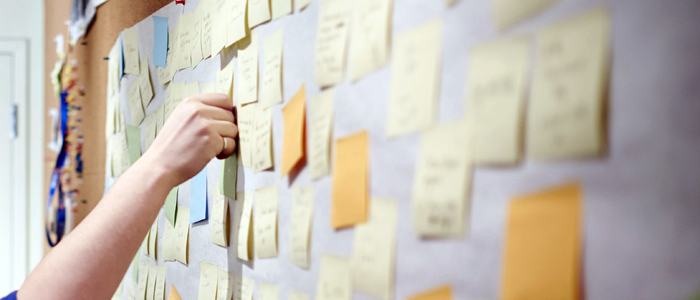
When the library strategic planning team set out to craft the Library Strategic Plan 2020-2025, they started with a specific set of goals:
- Include refreshed mission and values statements and add a vision statement for the first time
- Create a path for the Library to move forward and evolve with high-level goals that could be operationalized
- Leverage the new campus strategic plan by building on the campus directions while also positioning the Library as a key partner for helping Waterloo achieve its objectives
- Incorporate new national/international academic library and archives directions
- Bring in voices from across the Library with strategic planning team representation from library departments and committees
While they used Waterloo’s overall strategic plan as a starting point to identify themes and discussion topics for brainstorming, the team also considered the ideas, values and strategic roles that libraries play in academia and as institutions that uphold core values of equity, openness, and intellectual freedom.
Through an 18-month process, the team gathered feedback and consulted with a number of stakeholders:
- A strategic planning team of library staff representing all departments and levels of responsibility across the Library participated in five brainstorming sessions
- Library departments and committees provided feedback on the revised mission and value statements
- The draft plan was shared for feedback through library-wide drop in sessions
- A consultation draft was made publicly available for broad feedback
- A town hall was held in March 2021 to share the final plan campus-wide
While the pandemic interrupted the process, the experience of pivoting to develop the services and resources needed to support online learning and research reinforced the need to embrace flexibility and agility. Those core competencies are reflected in the plan, as is a key emphasis on partnership.
FOSTERING STUDENT CONNECTIONS
Library ambassador program
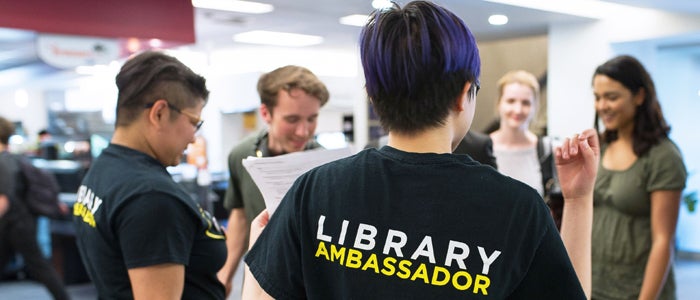
Library ambassadors offer peer-to-peer connections and creative solutions
The library ambassador program launched in 2016 as a way to provide leadership opportunities to students and to help the Library make enduring connections with students on campus.
Library ambassadors play an important role in reaching out to students, parents, faculty and staff. In a typical year, the library ambassadors organize various on-site events to help engage students and educate them about library services. They also represent the Library at campus fairs and events.
Pandemic pivot
Each term, students are tasked with a term project, which involves writing a project proposal, budget and marketing plan. The project must focus on how the Library can connect with the campus community and raise awareness about library services. In 2020, in-person interaction came to a halt, and library staff and ambassadors had to take a more creative approach to connecting with students.
The team quickly got to work creating virtual fairs and events. To make the events engaging and interactive, participants were given clues to follow to help them learn about and find various library resources. For example, in October, the team hosted a “Trick or Treat Yourself to Library Resources” online event with a murder mystery theme.
The ambassadors have also increased their presence on social media, running account take over days and posting instructional videos that are shared among students. The Library has seen social media followers increase, and student interaction has gone up as students use social media to communicate and ask questions.
Providing valuable experience
The ambassador experience helps students gain valuable skills that they take with them on their academic and career journeys:
“The position of the library ambassador was my first job in Canada. It helped me transition from a shy and timid person, to a lively person who can communicate with people a lot better than her past self. In all my interviews for my next co-op placement, I found employers asking me questions based on this position. I was told they called me for an interview because they appreciate students who are active in the campus community. I ended up getting three offers.”
Whether online or in person, the library ambassador program provides an important peer-to-peer service in the Library. Students appreciate interacting with their fellow students while the ambassadors enjoy a unique opportunity to promote the Library and gain valuable leadership experience.
The Library on social media
Instagram
@UWLibrary
Twitter
@UWLibrary
Facebook
@UniversityofWaterlooLibrary
Popular events
CELEBRATING DONOR GIVING
Donor profile
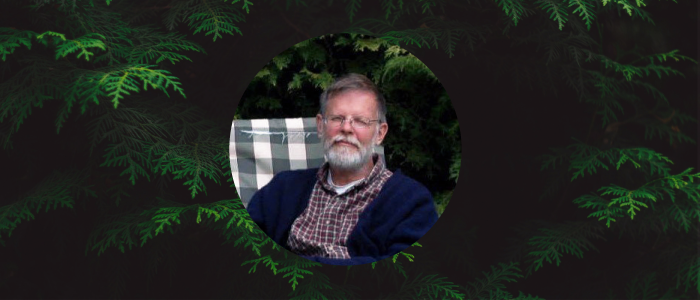
Photo by Alain Charest
When Lorne Ellaschuk moved to Kitchener, he didn’t have an existing connection to the University of Waterloo. Over the years, the Library came to be a special place for him. Mr. Ellaschuk has generously made annual donations to the Library, and he recently made us aware of his plans to leave a bequest in his will. In Mr. Ellaschuk’s own words, this is why the Library is important to him:
A good library is a great pleasure to me. Dana Porter is a good library.
In the late 1970s, I returned to Canada after studying as a graduate student in English Literature at London University in England. Although I am originally from British Columbia, I came to live in Kitchener where my partner lived and worked. I started a small catalogue book business. At that time, a major recession was underway, which was accompanied by a great deal of inflation.
In 1980, I got a community borrowers card from Dana Porter Library.
I have, since 1980, regularly taken books out of Dana Porter. Often they are academic monographs that were hugely expensive forty years ago, and continue to be. Such books I couldn’t afford to buy, so I have always been grateful for the access to them.
I was then, and remain, a reader of books. I am, I think, a good reader too, but I am not a scholar or a literary critic. When I’m alone in a room — a personal library with a wood fire and a good lamp — I am very happy.
I love to browse shelves. I have taken out books in visits usually about every two weeks until the last decade.
The Library has mattered greatly to me over the years.
Generous donations make “Giving Tuesday” a success for the Library!
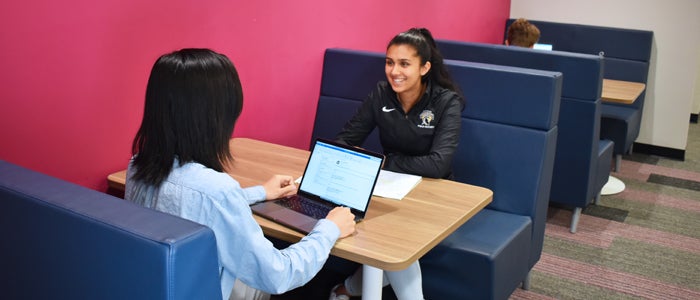
Giving Tuesday has become a worldwide phenomenon. The movement was started in 2012 by the United Nations Fund, in collaboration with the 92nd Street Y in New York City. The team selected the Tuesday after U.S. Thanksgiving with the hope that, after the consumerism of Black Friday, people would be interested in finding ways to give back.
Our library donors were exceptionally generous in 2020. Key to the success of the day was an anonymous donor, a 1987 graduate, who offered to match all gifts to the University of Waterloo Library Fund up to $4,000 — a challenge that proved inspiring to many.
Our donors responded
Thanks to 48 generous donors, we exceeded that match and raised a total of $13,621.
With these contributions to the University of Waterloo Library Fund, we will support programs to equip our students with key information navigation and assessment skills while providing a place for community and learning.
With the shift this year to intensive online learning, we’ve learned more about the value of creating online experiences. The fund will also be used to expand our programming to include activity, reference support and community-building space in a digital environment.
Why donate?
When asked about why they decided to match gifts to the Library for Giving Tuesday, our generous donor said,
"I know the value of a university education, and I know the valuable role libraries play in equipping people with the information skills required to succeed in our increasingly knowledge-based economy. I chose to become a matching donor to the Library on Giving Tuesday to demonstrate my support and encourage others to become donors. We need a diverse base of funding to ensure a university education is accessible to all and private support is a very important component of that."
To our matching gift donor and everyone who contributed to the Library — on Giving Tuesday and throughout the year — thank you!
To learn more about how you can provide a matching gift or donate to the Library, please contact Meghan Whitfield.
BY THE NUMBERS
Reference and research support
 8,318Chat interactions480% more than 2019
8,318Chat interactions480% more than 2019 2,412In-depth research consultations34% more than 2019
2,412In-depth research consultations34% more than 2019 19,387Reference interactions overall
19,387Reference interactions overall 5,269Emails369% more than 2019
5,269Emails369% more than 2019Instructional sessions
 235E-learning sessions
235E-learning sessions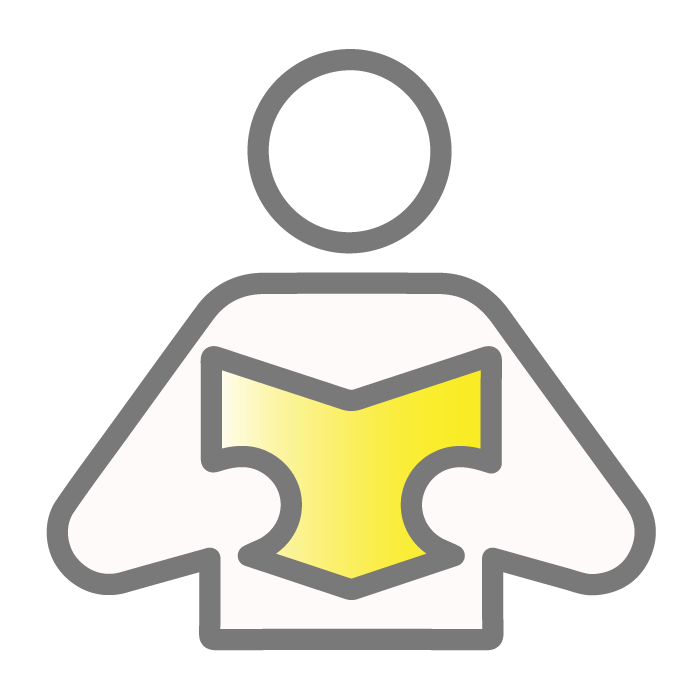 117In-person sessions
117In-person sessions 12,914Attendees
12,914AttendeesResources
 247,720Downloads of course reserve materials16% more than 2019
247,720Downloads of course reserve materials16% more than 2019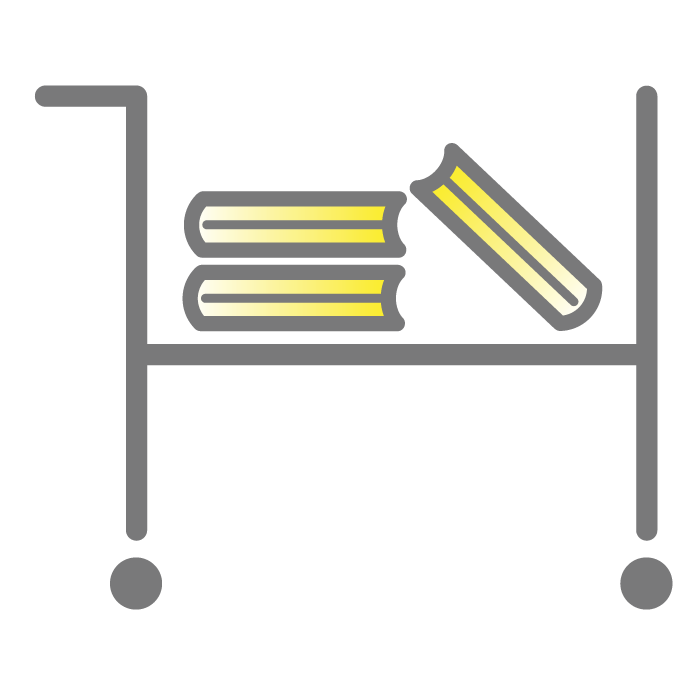 3,333Book pickup services (loans)
3,333Book pickup services (loans)Library budget and expenditures: 2019-2020
$21M CAD
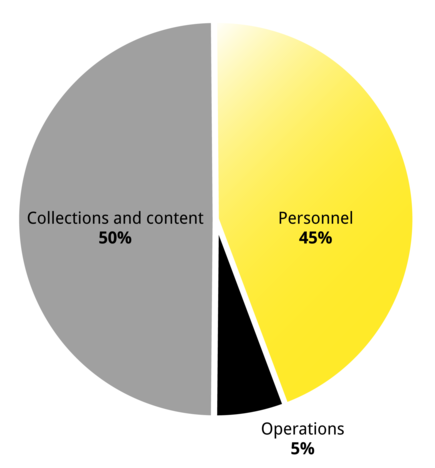
Library budget and expenditures for 2019-2020: $21M CAD
Collections and content 50%; Personnel 45%; Operations 5%
Please note you may need to adjust your browser settings to zoom in for optimal viewing.


